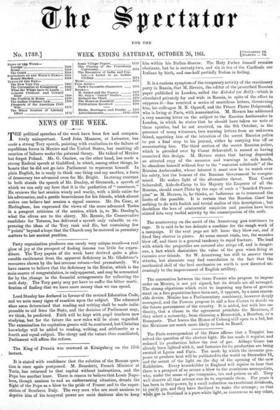It is a curious symptom of the temporary activity of
the reactionary party in Russia, that M. Herzen, the editor of the proscribed Russian paper published in London, called the Kolokol (or Bell)—which is circulated privately far and wide in Russia, in spite of the effort to suppress it—has received a series of scurrilous letters, threatening him, his colleague M. N. Ogareff, and the Prince Pierre Dolgorouki, who is living at Paris, with assassination. M. Herzen has addressed a very amusing letter on the subject to the Russian Ambassador in London, in which he states that lie should have taken no note of these epistles, had he not received, on the 9th October, in the presence of many witnesses, two warning letters from an unknown friend, apprising him of the intention of the secret Russian police to put a final stop to his journal, either by carrying him off or assassinating him. The third section of the secret Russian police, which is presided over by Count Schuvaloff, is named as having conceived this design. M. Herzen states that having deposited an attested copy of the menaces and warnings in safe hands, he abandons himself without fear to the " maternal solicitude" of the Russian Ambassador, whose interest it must now be to watch over his safety, lest the honour of the Russian Government be compro- mised. He makes light of the alternative threat. That Count Schuvaloff, Aide-de-Camp to his Majesty the Emperor of all the Russias, should enact Pluto by the rape of such a "bearded Proser- pine" as M. Herzen, is, he thinks, so ludicrous as to transcend the limits of the possible. It is certain that the Russian Court has nothing to do with foolish and trivial malice of this description ; but doubtless the lees of aristocratic suspicion and passion have been stirred into very turbid activity by the emancipation of the serfs.






























